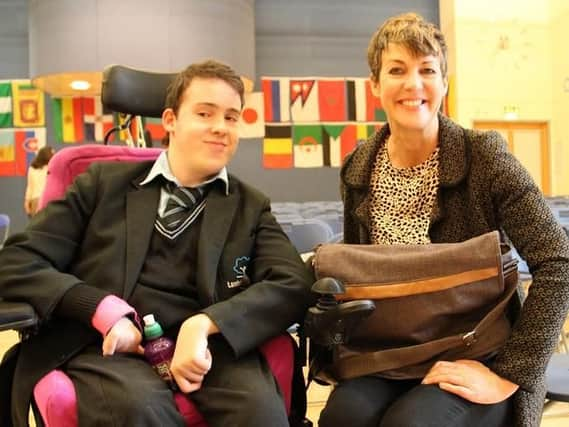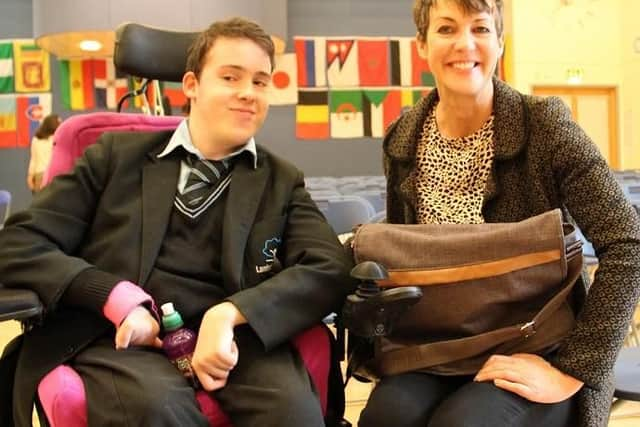Wigan special needs schools see 25 per cent rise in pupils


Research by the Wigan Post and JPIMedia’s data unit revealed an increase of almost a quarter in the number of pupils at the borough’s special schools in the past seven years.
It mirrors the national picture, where the number of children with special educational needs (SEN) in mainstream schools is falling, while the number in special schools is rising.
Advertisement
Hide AdAdvertisement
Hide AdThis is despite the introduction of the Children and Families Act 2014, which states that children with SEN should usually be given a place in mainstream classes.


The Government said all schools should be inclusive.
The Alliance for Inclusive Education (ALLFIE) accused the Government of an “ongoing attack on disabled people’s rights to be included rather than segregated from society”.
And campaigners have accused schools of putting exam results and their reputations before the needs of disabled pupils.
The number of children with special educational needs in mainstream education has fallen by a quarter (24.4 per cent) in England since 2012, while the number attending special schools has risen by nearly a third (30.8 per cent), analysis by JPIMedia shows.
Advertisement
Hide AdAdvertisement
Hide AdMainstream schools in England are now the least inclusive in the UK, with only about one in seven children in mainstream primaries and one in eight children in mainstream secondaries having special needs.
In Wigan, there has been a 24.6 per cent increase in the number of pupils at special schools, rising from 590 in 2012 to 735 this year.
Meanwhile, there has been a drop in the number of children with SEN attending mainstream primary and high schools in the borough.
In 2012, there were 4,930 SEN children in mainstream primary classes, accounting for 19.2 per cent of pupils. There were 4,350 in 2019, which was 15.5 per cent of children. For mainstream secondary schools, 21.5 per cent of children had SEN in 2012 (3,980 pupils), dropping to 13.7 per cent (2,516) by this year.
Advertisement
Hide AdAdvertisement
Hide AdLast month, Wigan Council’s cabinet agreed to proceed to consultation on plans to rebuild Hope School at Central Park, on Montrose Avenue.
It is the first phase of a 10-year plan to transform special educational needs provision in the borough.
There are further proposals for new buildings for Rowan Tree Primary, Landgate and Willow Grove Primary schools, as well as to extend Oakfield High.
But Simone Aspis, policy and campaign co-ordinator at ALLFIE, believes the Government should do more to support pupils with SEN to attend mainstream schools.
Advertisement
Hide AdAdvertisement
Hide AdShe said: “Currently, the Government’s only offer in dealing with the shortfall in SEND places crisis is the opportunity for local authorities to bid for new special schools rather than additional funding to maintain and expand existing mainstream schools’ capacity to facilitate disabled pupils’ inclusion.Parental choice is a myth - parents we know do not choose special school provision, they are forced into it because mainstream schools no longer have the money and support to implement inclusive education practice.”
She added: “This is no longer about austerity, but rather this Government’s ongoing attack on disabled people’s rights to be included rather than segregated from society.”
Cath Pealing, interim assistant director for education at Wigan Council, said: “We are committed to ensuring all pupils with special educational needs get the very best education. Children accessing specialist provision rather than staying in mainstream schools is not something specific to Wigan borough. It is an issue experienced on a national level and it is something we are working with our families on to address.
“In Wigan we have an effective transformation programme in place and are currently developing our SEND strategy and education strategy for the next three years.
Advertisement
Hide AdAdvertisement
Hide Ad“We are also working on a large-scale project over the next 10 years, which will create more school special school places where needed across the borough, including rebuilding schools where current facilities are outdated and need investment. We are also looking at how we use these places differently and more flexibly to support children to remain in their mainstream school where appropriate.
“We are already so proud of the excellent specialist provision we have in place and are confident this investment will put us in a strong position to meet future demand so our children and young people get the best education and support.”
The Department for Education said: “It is right that parents can say which school is best for their child, especially for those who have special educational needs.
“All schools must be inclusive of children with disabilities and 82 per cent of all pupils identified as having special educational needs are in state-funded mainstream schools.
Advertisement
Hide AdAdvertisement
Hide Ad“Additionally, we have created new special schools in response to the increasing number of pupils with complex special education needs and are committed to delivering even more provision to ensure every child is able to access the education that they need.”
Lucy Bartley’s son Samuel, 17, has just finished year 11 and has an education, health and care plan (EHCP). Samuel was born with spina bifida, hydrocephalus and hemiplegia. He has both physical and learning disabilities and has attended mainstream primary and secondary schools.
Lucy said: “Instinctively when Samuel was born, I knew he shouldn’t be treated differently from his sisters. Why shouldn’t he go to the same nursery as his sisters? And their relationship has always been so important so why would I separate them almost intentionally?
“I’ve always had the strongly-held belief that Samuel has as much right to experience things as our girls and he’s part of our family, not separated off.
Advertisement
Hide AdAdvertisement
Hide Ad“Why would you separate a whole group of people on the basis of their impairments? You wouldn’t do that in any other area.”
Lucy said the family “had a battle” getting Samuel into the primary school his older sister attended. They ended up fighting the matter at a tribunal, which they won.
She said: “My only reservation about sending Samuel to a mainstream school was that he was the sole wheelchair user, which I think was a big thing in his school environment. It’s all or nothing. The alternative would have been for him to go to a special school where say 60 per cent are wheelchair users.
You’ve got this system which basically enshrines that segregation. I know from Samuel’s perspective he felt different and a bit lonely part of the time because there has been no-one else and he’s been aware he has been the only wheelchair user.”
Advertisement
Hide AdAdvertisement
Hide AdShe said Samuel’s secondary school has been very good at facilitating the curriculum and courses that he needed, but also in supporting his physical and learning needs and implementing his EHCP.
Lucy said as the parent of a child with disabilities, you can never “take your foot off the pedal” in fighting for a place in mainstream education.
She said: “We have a fairly toxic and I would argue a hostile education system with the fact that the emphasis is all on results and attainment and schools’ reputations.”